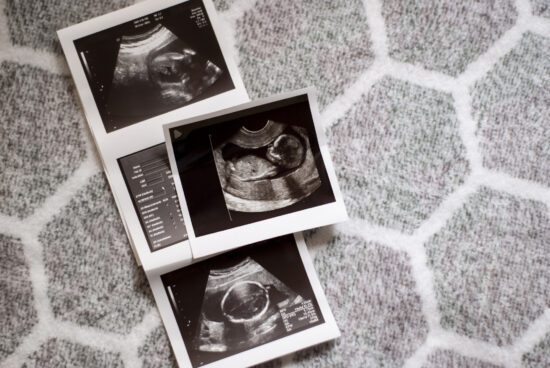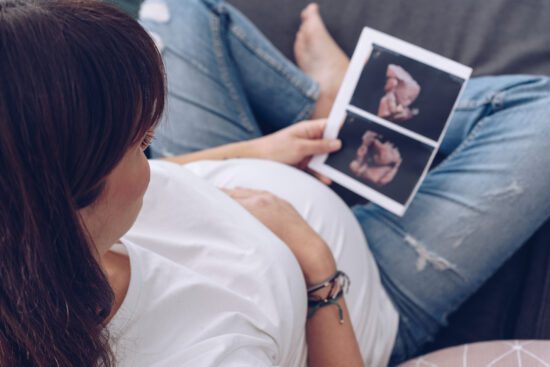It’s an odd experience, shaking hands with the mother of your son before you get a chance to hold him. My pulse was racing when my husband and I sat down in the adoption agency office to chat with the woman who was changing our lives at great cost to her own.
“Good to meet you,” she’d said, smiling warmly in a way that would become familiar, reflected in our son’s cheerful face. Later, I tried to consider the anxiety she might’ve felt walking into that room. She had more reasons to be scared than I did, but she didn’t act flustered. Maybe she’d bathed in the same inexplicable peace that had washed over me halfway through our meeting. All at once, I sensed this moment as a God-ordained melding of families birthed from different brands of labor pains.
My husband and I had embarked on the adoption path after years of struggling to conceive. In the midst of our grief, God reawakened our desire to adopt, an idea he had planted early in marriage before we discovered our fertility issues. We set out expectant and hopeful, yet wary of the potential for further heartache.
Though my husband and I chose adoption as a way to grow our family, the choice of who would become our child rested on the will of another woman. This mother faced the shock of an unexpected pregnancy, endured the labor and delivery process, and carried the weight of an agonizing decision about how to care for her child. Whereas we were left wondering when and how we’d have a baby, she had to ponder if she’d take her baby home or place him in someone else’s arms.
A loving choice
Birth mothers who make adoption plans for their children are often assumed to be reckless teens or meth addicts looking for an “easy way out” of a costly predicament. Our son’s birth mother defied these and other negative stereotypes that still exist in our culture. She was 25, had family support, and with some difficulty, would’ve cared for her son to the best of her ability.
Other birth mothers also diverge from the stigma that casts them as deadbeats or victims. While circumstances vary, a birth mother might be healthy and loving, but encumbered by a number of factors that could impair her ability to parent: domestic conflict, lack of a father figure, financial distress, or other life crises. Some challenges or adverse conditions lead her to believe another family would provide better care for her child. As blogger and birth mother Leah Outten writes, “There is not one type of a birth mother. We are all different people with different stories—the common thread is our choice.”
In our situation, our son’s birth mother was unmarried and unprepared to be a mother. Through the Spirit moving in her heart, she placed her son’s needs above her own desires and decided to make an adoption plan. Love—not selfishness or irresponsibility—motivated her to seek better care for her child than what she was capable of offering at the time.
With the help of her family, she carefully weighed the aspects of a mother, father, and home life that were important to her and looked through several albums profiling prospective adoptive couples. By God’s sovereign orchestration, she chose us, not because we had any merit making us perfect parents, but because of her wisdom in knowing what was best for her child.
Our situation doesn’t fit the rescue narrative overemphasized in adoption discourse. We didn’t swoop in and airlift our son out of a hostile environment, nor did we do him a favor by performing a noble deed. On the contrary, his birth mother exercised maturity and bravery choosing adoption as the best means to give him a loving family.
A healing path
Mutual love for our son has bound us together as a unique extended family. We’ve chosen to stay in contact since the day we met, and have maintained a progressively open relationship with one another through video chats and occasional visits. Our son knows us, his parents who love and care for him daily, and his first mother, who carried him and brought him into this world.
Several studies have demonstrated the benefits of maintaining some level of openness with birth mothers. Relationships wherein both adoptive parents and birth parents jointly tell the story of adoption have been shown to facilitate positive outcomes for adoptees.
Despite these findings, some prospective adoptive parents and those outside the adoption world question the purpose of openness and shy away from it as a threatening arrangement. From my experience talking with couples interested in adoption, this stems from a fear that birth mothers will retract their plans and want to take their children back into custody even after their rights are terminated.
This fear is unfounded, as birth parents typically can’t contest guardianship after an adoption is finalized. Although it seems risky allowing a birth mother to see and spend time with her child, tempting her to regret her decision and whisk away her child, that contact is often reassuring for the birth mother. Seeing her child flourish in the care of the adoptive parents can reaffirm her decision and help her move forward in life after experiencing the grief of separation.
Birth mother Adrian Collins wishes she’d be given the opportunity to establish an open relationship when she placed her daughter for adoption. In an email interview, she explained why she believes some interaction with her daughter and the adoptive family would’ve helped her process her loss: “For years, I sat wondering about my daughter. What did she look like? Was she happy? Did she have any of my personality traits? Did she know I loved her? If I’d had the option to develop a relationship and know the answers to my questions, I believe it would have significantly improved the healing process. Healing begins with open communication.”
A living illustration of the gospel
Though adoption by definition arises from loss and separation, the creation of a new family facilitates healing, restoration, and unity. In this way, the decision our son’s birth mother made exudes redemption. Her love mirrors the sacrificial love of our Savior, who secured our eternal future in heaven and provided a model for faithful obedience here on Earth: “This is how we know what love is: Jesus Christ laid down his life for us. And we ought to lay down our lives for our brothers and sisters” (1 John 3:16).
Missionary Jim Elliot wrote in his journal, “He is no fool who gives what he cannot keep to gain that which he cannot lose.” Our son’s birth mother chose loss to bring life, fracture to create wholeness, disruption to effect shalom. Through her, we’ve not only gained a son, but also a larger, more complete extended family, as well as a living illustration of the gospel. While not all birth mothers come from the same circumstances or share the same intentions, many choose adoption because they love their children, and should therefore be respected for making a difficult decision to protect and provide for the children they treasure.
We can’t repay our son’s birth mother for the gift she gave us. Through God’s unforeseeable plan, we chose adoption to grow our family; she chose us to become parents; and we’re all enriched because of it. I’m forever grateful for her, and for how she laid down her life to raise our son.
From the tiniest unborn life to the elderly at the end of life, from immigrants and refugees to those trafficked against their will, all life matters to God. Join the ERLC in Washington, D.C. on January 17-18, 2019, for Evangelicals for Life, one of the largest gatherings of pro-life Christians in the country. Speakers include Russell Moore, J.D. Greear, Steven Curtis Chapman, Keith and Kristyn Getty, and more. Register now to join us!







